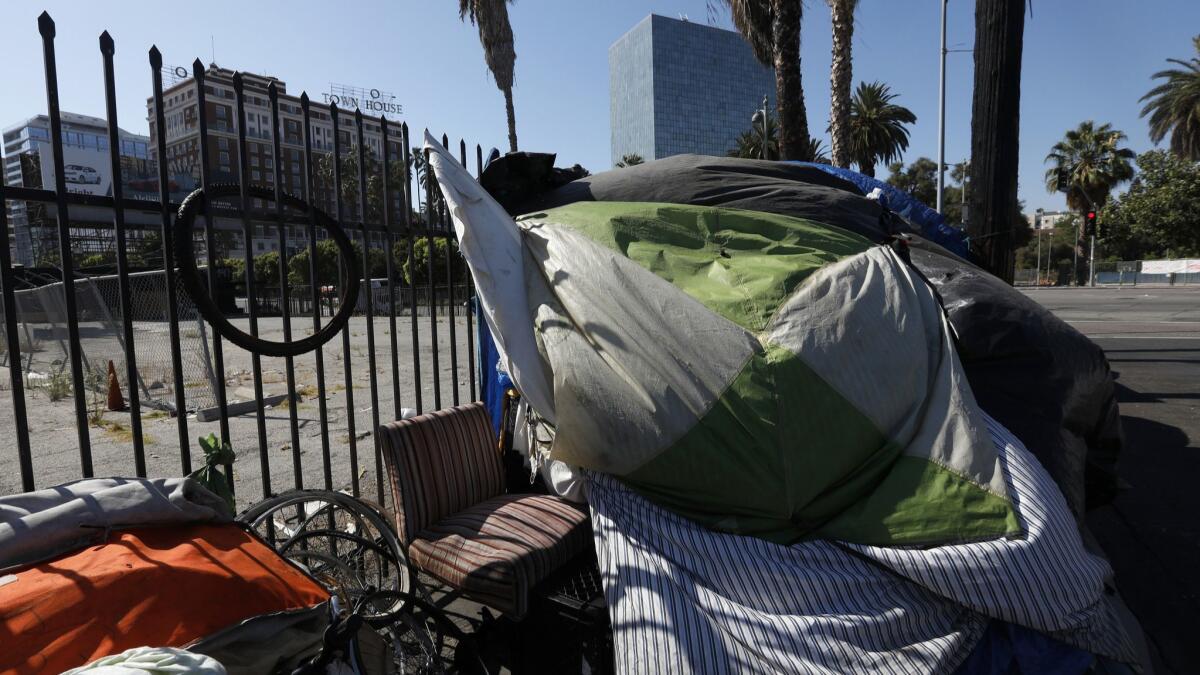Homeless people in California, Western states cannot be prosecuted for sleeping outside if shelter access is lacking, court rules

- Share via
Reporting from San Francisco — Prosecuting homeless people for sleeping on public property when they have no access to shelter violates the Constitution’s ban on cruel and unusual punishment, a federal appeals court decided Tuesday.
The U.S. 9th Circuit Court of Appeals unanimously overturned a district court decision in favor of the city of Boise, Idaho, in a case in which homeless people challenged two city ordinances that barred them from staying overnight on public property.
The ruling will protect the homeless not only in Boise but in California and other Western states from ordinances that punish them for being unable to obtain shelter.
The challengers, who had been cited under the Boise ordinances, sought damages and a court order barring the city from enforcing the laws.
After the litigation began, the Boise Police Department decided in 2010 to prohibit enforcement of the ordinances against any homeless person on public property on a night when no shelter had “an available overnight space.”
Police continued to cite homeless people on nights when there was availability in the shelters.
The 9th Circuit, though, cited evidence that some shelters limited the number of days a homeless person could stay or turned away people who arrived past certain hours.
Others required a religious commitment, the court said.
“A city cannot, via the threat of prosecution, coerce an individual to attend religion-based treatment programs,” Judge Marsha S. Berzon wrote for the court.
Even though the shelters had beds, some homeless people did not have access to them, the court noted.
Tuesday’s decision reinstated a 2006 9th Circuit ruling in a challenge to a Los Angeles homeless law. A settlement was eventually reached in the Los Angeles case, and the ruling lost its value as a precedent.
The panel hearing the Boise challenge said it agreed with the ruling in the Los Angeles case and reiterated that the homeless may not be held criminally responsible for sleeping on government property when no alternative shelter was available.
“The 8th Amendment prohibits the imposition of criminal penalties for sitting, sleeping, or lying outside on public property for homeless individuals who cannot obtain shelter,” Berzon wrote.
The court said its holding was narrow. It does not require a city to allow anyone on public property at any time or mandate that cities provide adequate shelter.
Rather, the court said, “as long as there is no option of sleeping indoors, the government cannot criminalize indigent, homeless people for sleeping outdoors, on public property, on the false premise they had a choice in the matter.”
In a partial dissent, Judge John B. Owens wrote that he agreed with most of the ruling but would have limited some of the plaintiffs’ claims.
Twitter: @mauradolan
More to Read
Sign up for Essential California
The most important California stories and recommendations in your inbox every morning.
You may occasionally receive promotional content from the Los Angeles Times.











